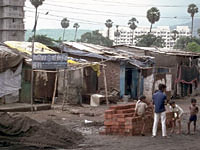Almost 30 years ago I returned from a long stay in India with my mind, body, and senses full of dust and color, peace and violence, holiness and crassness, all the contradictions of a land so different from my own.
I thought I would remember always the faces of the villagers. I was pained by the enormous gulf between the quality and quantity of their food and homes and possessions and the food and homes and possessions to which I returned.

A house in the suburbs.
But experiences, no matter how powerful, fade. The messy, mind-boggling, raw reality of India receded into memories — memories that have driven everything I have done since, but nevertheless dustless, colorless abstractions — until last week when I got an email message from my friend Vicki Robin, just back from her first trip to India.
“I watched India flow by my bus window for hours,” Vicki wrote. “Unrelenting poverty, sober poverty, millions of people living in poverty. I saw the rock chippers, roving tribes that spend their days pounding boulders into gravel for roadbeds. Women. Men. Toddlers. All with hammers, pounding rock.
“Then there were the people lying on mattressless cots in houses the size of U.S. walk-in closets. Street vendors fried up ‘fast food’ lunches while their children washed the pots with river mud. Shopkeepers occupied stalls about as big as a Pepsi display in a U.S. supermarket, selling bananas or pots or fabric, with only a day’s supply of inventory.”

Working the fields.
As I read Vicki’s words, the reality of India came back in a rush. The smoky sunsets, the necklaces of strung marigolds for sale in the markets, the bony cows, the desperate or deadened eyes of hungry children. Poverty isn’t pictures on TV. It isn’t 30-year-old memories. It is the lived experience of hundreds of millions of people today, tomorrow, every day.
Vicki went on: “What I came to understand was that many of these people had no hope. Not that they had not eaten that day. Not that they had only rags to wear. But that the fragile thread of hope had snapped — the sense that through some effort they might take care of themselves and their children and better their lot.
“A story: In the state of Gujarat the water table is collapsing, drained faster than it is recharged. In Rupal, a village of maybe 50 homes, I visited women who had the grit to organize, save money, badger the bureaucracy, and get a well and pump constructed so they didn’t have to carry water three miles daily.
“They were beautiful, proud, and fierce. They showed me their well, next to a river that was ‘strangely’ dry this year. They explained their next project: getting pipes installed so every home would have running water
“In 20 years, I thought, these women, in spite of their determination, will be out of water. This town will be dead. They don’t know it. They can’t do anything about it. Choices made upstream — dams, irrigation projects, demand from cities — will wipe these people out.

Out on the street.
“Another story: Peasants in a coastal village got the money and gumption to put in a sea wall to reclaim a salt marsh for farming. They irrigated the land for a year to wash out the salt and then planted cotton and subsistence crops. When the landlords realized that this small degree of self-sufficiency meant the peasants would no longer be available to work for a pittance, they burned those crops. In one day the courage and work it had taken to carve out this small arc of security was crushed.
“Another story: Two beautiful young women pound coconut husks to extract fiber for rope. They are so finely featured that with a small twist of fate they could be $1,000-a-day New York models. Instead, with no self pity and without stopping their steady thwacking, they explain that they can do three piles of husks a day (worth $1.75) before their arms give out.
“Thousands of people living in black plastic villages in the dusty outskirts of cities. People with one possession — a razor, an iron, a wrench, a bicycle rickshaw — upon which their livelihood depends. They aren’t ‘poor but happy’ or ‘poor but spiritual’ or ‘poor in things but rich in relationships.’ Those North American platitudes fell in big chunks out of my brain, never to be uttered again.
“It isn’t okay that anyone has to live in grinding poverty. Any six-year-old knows that. It’s even less okay that poverty is held in place by a web of circumstances that makes my life (and yours) very comfortable.”
Vicki didn’t even try to offer solutions. “That’s way too American a thought, especially in my infancy with this issue. But my eyes have seen enough to know that it is right, just, and moral that we use the freedom and ease and education and opportunity and affluence that we enjoy here to speak and act on behalf of folks who have no voice and no hope. We need to speak, not for our own comfort but so our species will mature into the lovely, gracious, compassionate collective we have it in us to be.”
Speaking out with the passion of fresh experience is, as Vicki Robin admits, not a solution. But it is out of such passion, not out of old romantic memories or flat TV pictures, that solutions will come.
Thanks so much, Vicki, for the reminder.


